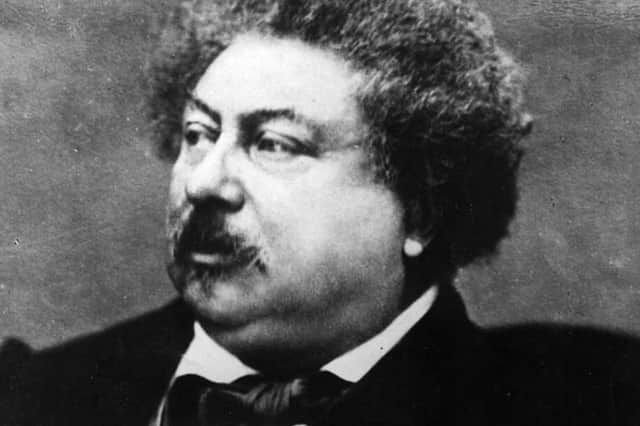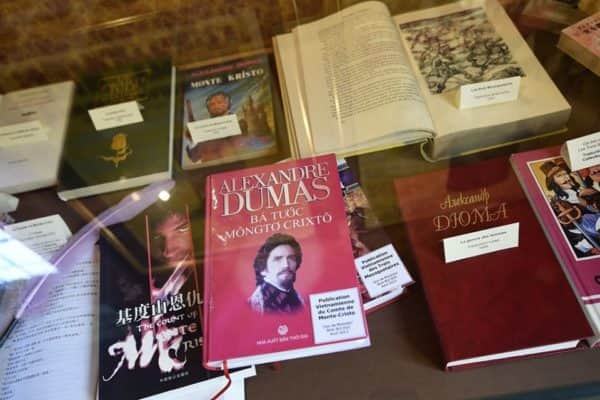Today’s Google Doodle celebrates French author Alexandre Dumas - here’s why


Today's Google Doodle (28 August) celebrates Alexandre Dumas, one of the most revered French authors of the 19th century.
Here's everything you need to know about his life and works.
Advertisement
Hide AdAdvertisement
Hide AdWho was Alexandre Dumas?
Dumas was born Dumas Davy de la Pailleterie in 1802 in Villers-Cotterêts, a commune in the north of France, and adopted the surname of 'Dumas' in his adult life in recognition of the ancestry he came from.
Dumas' father Thomas-Alexandre was born in the French colony of Saint-Domingue (now Haiti), the mixed-race son of a French nobleman and Marie-Cessette Dumas, a slave of Afro-Caribbean ancestry.
What is he famous for?
Dumas began his writing career working on articles for magazines and plays for the theatre, and his first play - titled Henry III and His Courts - was produced when he was 27 years old, and was met with acclaim.
A similar success the following year afforded Dumas the income to focus on writing as a full-time job.
Advertisement
Hide AdAdvertisement
Hide AdHe was a shrewd businessman and switched to writing novels after recognising the value in newspapers publishing stories as serials.
What books did he write?
Dumas rewrote his plays as serial novels, and founded a production studio staffed with writers who turned out hundreds of stories, subject to his direction, editing and additions.
He was one of the first exponents of true-crime, and between 1839 and 1841 compiled an eight-volume collection of essays on famous criminals and crimes from history titled, Celebrated Crimes.
Alongside his novels, he wrote travel books inspired by his journeys, which were in turn motivated by his role in the French revolution and other socio-political movements.
Advertisement
Hide AdAdvertisement
Hide AdDumas faced discrimination related to his mixed-race ancestry across his career, and though best known for 'high adventure' like The Three Musketeers and The Count of Monte Cristo, also penned works that addressed the issues of race and colonialism.
Famously, when insulted about his partial African ancestry, Alexandre Dumas replied by claiming his great-grandfather was a "monkey", and rounded off his response with, "You see, Sir, my family starts where yours ends."
Was he married and did he have children?


Despite his money-focused mind, it is said Dumas led an extravagant lifestyle that saw him always spending more than he earned.
Despite being married, one scholar researching Dumas' life found evidence of nearly 40 mistresses.
He is known to have fathered at least four children.
Advertisement
Hide AdAdvertisement
Hide AdWhen did he die?
Dumas died in 1870 aged 68 near the coastal community of Dieppe in Normandy, France.
He was buried in Villers-Cotterêts in the department of Aisne, the place of his birth.
Which works were published posthumously?
Dumas was prolific throughout his career, writing across a number of genres and publishing over 100,000 pages of content in his lifetime.
He was so prolific in fact, that researchers and historians continue to find 'new' works of his, such as The Gold Thieves, a five-act play found in the national library of France in 2002 by a scholar, and published two years later.
Advertisement
Hide AdAdvertisement
Hide AdPrevious to this, scholar Claude Schopp found a letter in an archive in 1990 that led him to discover an unfinished work, Dumas.
The novel was finally published as The Last Cavalier some 16 years later after years of research, editing and Schopp's writing of the final two-and-a-half chapters, based on Dumas' notes.
Who created today's Doodle?
Today's Dumas Doodle was created by artist Matt Cruickshank, who says he was inspired by "the rich and beautifully told tale of Edmund in The Count of Monte Cristo."
"The settings and characters are so wonderfully thought out," he adds. "It’s a treasure trove of visual ideas."
Cruickshank is hopeful people will be inspired by Dumas’ "incredible storytelling", and says "we can learn so much from this larger-than-life man!"